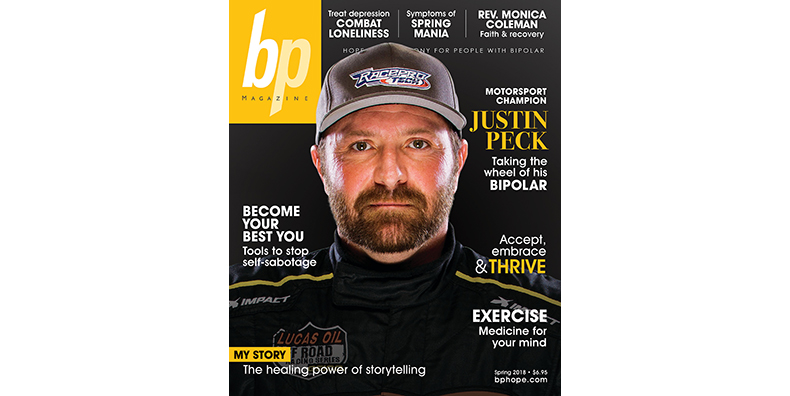Honored to be featured on the back page of bp hope, the magazine offering hope and harmony for people with bipolar. Linda Childers interviewed me and
This scholar, minister, and author of Bipolar Faith: A Black Woman’s Journey with Depression and Faith talks stigma, faith, and the creativity of vegan cooking.
As an author, scholar, and minister, Monica A. Coleman, PhD, knows what it’s like to navigate the intersection between race, faith, and mental health. The 43-year-old professor of Constructive Theology and African American Religions at Claremont School of Theology in Southern California, hopes that her groundbreaking memoir, Bipolar Faith: A Black Woman’s Journey with Depression and Faith, will help others reconcile living with bipolar disorder with their religious beliefs.
You’ve talked about yours as a journey with losing faith and then finding it again. How has this played out?
Living with deep depressions creates a suffering driving me towards God with questions and pleas for help. I’ve felt abandoned by God and churches. I’ve lost my childhood faith, my teenage faith, and my young adult faith. But I found new ways of knowing God and new ways of being known by God. My deep conviction that God knows me from the inside out, understands and cares for me is what sustains me during the most challenging times with my mental health.
When you were younger, you kept your diagnosis to yourself, why?
I felt people wouldn’t love me if they knew I was always sad, so I self-medicated by getting involved in sports such as track, where I could achieve that runner’s high of endorphins. I used to make a list of things I could do to make me happy for 15 minutes at a time.
How has your own family’s experiences with depression affect your own journey?
In my grandparents’ day, they called it grief. When you’re poor and have survived slavery, sharecropping, and war, depression seemed like a normal part of life. No one called it depression or PTSD and they didn’t have access to the healthcare resources we have today, and they immersed themselves in their faith. Looking back at what some of my family members went through, I don’t blame them for my brain chemistry because I know it’s far more complicated. I have access to medication, self-care, and therapy that they never had.
What kind of stigma exists today in the African American community?
I think the taboo around depression is diminishing in the African American community, but many people are still seeking safe places where they can talk about their feelings. I hope I can help to break the silence surrounding depression in the African American community, and destigmatize the belief that a person needs to be strong and rely on their faith, as opposed to getting therapy.
As an ordained elder in the African Methodist Episcopal Church, what do you hope other members of the faith community can learn from your book?
In the African American community, many people look to their faith leaders for support, believing that seeking medical treatment constitutes a “lack of faith.” Some clergy never address the topic of mental health, or if they do, they discuss it in negative terms as if it’s a punishment from God. I work with faith leaders on how to be supportive of parishioners who are struggling with mental health issues, and encourage clergy to establish relationships with therapists in their areas so they can provide meaningful referrals.
What does your spiritual practice look like?
Most of my spiritual practices are small daily things I do—dancing, cooking, caring for my child. I rely on God for the energy and wherewithal to do them. These things ground me, get me out of my thoughts and help me to stay present in the moment.
How exactly does vegan cooking fit into your faith?
Vegan cooking (especially with my allergy to citric acid—no oranges, lemons, pineapples, or tomatoes) requires a lot of creativity from me. It’s deeply rewarding to create something I think is pretty and tasty, but the creative process is spiritual. The creativity of vegan cooking helps me to be a part of God’s creative work, too.
Music seems to be interwoven throughout your work; is it a soundtrack of your life in a way?
In some ways, music keeps me in time and place and connects me to culture. The music I heard in church, or that I danced to in the 80s and 90s, or that got me excited about living in California. But it’s more than that. I wanted the book to sound and look like my life.
What’s the most important takeaway for your African American community, and others as well?
That it’s complicated. That poverty, violence, war, trauma, grief, family history, brain chemistry, and personal life occurrences are all a part of our mental health story. And we can’t always tease those things out as sources for our current mental health status. These forces are operative in African American communities in certain ways, but I believe that this is an American story that many people understand. In the midst of this, we can know as much as we can, heal as much as we can, and find ways forward that are faithful to our experiences and God.
See Original publication here




